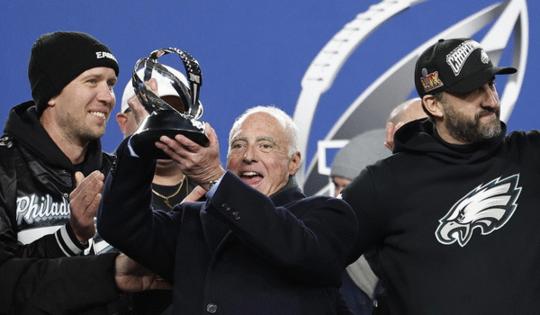Mike Sielski: With Philly at the center of the sports world, what does that mean for Jeffrey Lurie and the Eagles?
Published in Football
PHILADELPHIA — Here is a set of facts, provided in no particular order.
Philadelphia will host six matches during the 2026 World Cup. All of them will be played at Lincoln Financial Field.
Comcast Spectacor, which owns the Flyers, and Harris Blitzer Sports & Entertainment, which owns the 76ers, have agreed to a joint venture to build a shared arena in the South Philadelphia Sports Complex. The arena is supposed to open in 2031.
Pennsylvania Gov. Josh Shapiro made it clear, while the Sixers were pursuing a new arena at 10th and Market Streets, that he was not in favor of using state money to help fund the Sixers’ project.
Pennsylvania is amid a stretch in which it has hosted or will host several significant golf tournaments. Oakmont Country Club, near Pittsburgh, was the site of last week’s U.S. Men’s Open and will be the site of the 2028 U.S. Women’s Open. Philadelphia Cricket Club hosted the Truist Championship in May. The 2026 PGA Championship will be held at Aronimink Golf Club, and Merion Golf Club will host the 2026 U.S. Amateur and the 2030 U.S. Men’s Open.
In a March poll, readers of USA Today were asked to rank the best ballparks in Major League Baseball. Citizens Bank Park finished first. PNC Park in Pittsburgh finished fourth.
Lincoln Financial Field opened in 2003. Acrisure Stadium — known better by its previous name, Heinz Field — opened in 2001.
Now, a question:
What does Jeffrey Lurie think when he thinks about these facts?
He has owned the Eagles for more than three decades now, and it is clear that, with his 74th birthday approaching in September, he has entered the legacy-burnishing stage of his life. The Eagles have won two Super Bowls in the last eight years, reached another, and established themselves as one of the most respected franchises in the NFL.
Earlier this month, he donated $50 million to Penn Medicine and Children’s Hospital of Philadelphia to found the Lurie Autism Institute and fund research into and prevention of autism spectrum disorder. In December, he sold 8% of the team, and that sale revealed that the franchise was valued at $8.3 billion.
When Lurie sees the breadth of his domain, though, it’s 50/50 whether he weeps, because there is at least one more world left for him to conquer. That list of major events in Pennsylvania makes it clear that the state is all in on sports tourism as a revenue source, and, assuming they are completed and meet expectations, the South Philly sports complex’s renovation and regeneration would be another huge draw.
The Sixers and Flyers presumably will have a new, state-of-the-art arena; in Citizens Bank Park, the Phillies still have a home they can maintain on a 100-year timeline. Fenway Park, Wrigley Field, and, to a lesser degree, Camden Yards: The civic appeal of these ballparks hasn’t lessened as they’ve aged. If anything, it has increased.
Lincoln Financial Field doesn’t offer Lurie that opportunity for innovation, for a fresh start, for something bigger, shinier, more expensive and enticing.
A few soccer matches on a global stage can satisfy him only so much. He has never hid his desire, for instance, to host a Super Bowl. It was no coincidence that in January 2014, a couple of days before Super Bowl XLVIII at MetLife Stadium, Eagles president Don Smolenski told me that, if all went well — if a cold-weather, outdoor Super Bowl succeeded — the Eagles likely would put in a bid for the big game.
As it turned out, all did not go well. The train system throughout New York and North Jersey was overwhelmed. Traffic clogged the roads and highways. There was a ban on tailgating. And after a perfect Sunday night for football, a winter storm the next morning disrupted flights and other travel.
So Lurie’s hopes for the Linc as a Super Bowl venue pretty much were gone, and what was left? The stadium can’t host a men’s or women’s Final Four, and if the NFL does end up following through on the (terrible) idea of playing its conference championship games at neutral sites, the Linc won’t be an option.
But a domed stadium would.
The idea, in so many ways, sounds like a nonstarter. Such a project would come with an estimated cost $2 billion to $3 billion, and that’s just an estimate. SoFi Stadium in Englewood, Calif., for instance, was supposed to cost $2.66 billion; it reportedly ended up costing $6.75 billion in inflation-adjusted dollars. What chance is there that Lurie would cover that mammoth expense himself?
If Shapiro and other state politicians weren’t inclined to give the Sixers money for their arena, why would they give it to Lurie and the Eagles? Especially when the Steelers, whose stadium has been around longer, could make the case that if anyone should get a handout, it should be them? If Lurie couldn’t get around those obstacles, what would he do then?
The ripples from all these hypotheticals go on and on. They’re worth thinking about as the region enters what could be, what should be, an exciting time. Rest assured, the power people of Philadelphia sports already are.
____
©2025 The Philadelphia Inquirer. Visit inquirer.com. Distributed by Tribune Content Agency, LLC.







Comments